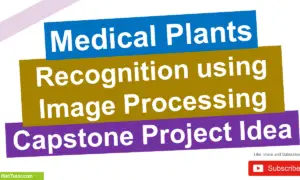Health Informatics Project Ideas
Introduction
Table of Contents
Health informatics is the blend of healthcare, information technology, and data science. It’s all about using data and technology to improve healthcare systems, making them more efficient, accurate, and accessible for everyone involved—from doctors and nurses to patients and administrators.
In today’s world, health informatics plays a crucial role. By organizing and analyzing massive amounts of health data, we’re able to make faster and better decisions in patient care, streamline medical processes, and even help predict or prevent diseases. Imagine systems that help doctors detect diseases earlier, applications that allow patients to monitor their health from home, or AI tools that assist in diagnosing conditions. These are just some of the powerful applications made possible through health informatics.
With advances in technology, health informatics covers a broad range of areas—from managing patient data in electronic health records (EHRs) to designing smart devices that help with real-time health monitoring, to even using AI for complex diagnostics. Whether you’re interested in improving patient outcomes, optimizing healthcare operations, or simply making healthcare more accessible, health informatics is at the heart of it all.
Key Areas in Health Informatics
Health informatics encompasses a range of specialized areas, each with its unique impact on healthcare. Here’s a look at some key areas where health informatics is making a difference:
- Data Management and Analysis
Efficient health data storage and analysis are foundational to healthcare today. Health informatics helps us securely store, organize, and analyze huge volumes of data, from patient records to research findings. This data-driven approach enables healthcare providers to gain insights, track patient histories, and improve decision-making, all while ensuring patient information is accessible, accurate, and protected. - Patient Care and Monitoring
Health informatics enhances patient care by integrating technology directly into patient monitoring and tracking. Wearable devices, apps, and smart tools now allow patients and doctors to keep tabs on vital signs and health status in real time, whether inside a hospital or at home. This means quicker responses to changes in health conditions, fewer unnecessary hospital visits, and more engaged, informed patients. - Clinical Decision Support
Clinical decision support systems (CDSS) use informatics to assist healthcare providers with evidence-based insights during patient care. These tools can analyze patient data and compare it with medical research, offering treatment recommendations, flagging potential issues, and reducing the likelihood of medical errors. By doing so, informatics gives clinicians the confidence to make well-informed decisions, ultimately improving patient outcomes. - Telemedicine and Remote Health
Telemedicine has rapidly expanded, especially in recent years, thanks to advances in health informatics. Patients can now consult with healthcare providers from the comfort of their own homes, allowing for regular care without the need for travel. Telemedicine applications also benefit rural or underserved populations, providing them with access to specialists and medical advice they might not otherwise receive. - Public Health and Epidemiology
Health informatics plays a key role in public health and epidemiology, helping us track, analyze, and control the spread of diseases. By collecting data from various sources (like hospitals, labs, and public health agencies), health informatics systems monitor disease outbreaks and provide essential data for timely responses. This technology can even help predict future health trends, guiding public health initiatives and policy-making for a healthier future.
Healthcare Management System with Online Appointment and Payment
Each of these areas shows the versatility and impact of health informatics in today’s healthcare landscape, making it an exciting and transformative field with the potential to improve lives worldwide.
List of Health Informatics Project Ideas
Here are some project ideas in Health Informatics, organized by area—web, mobile, AR/VR, and machine learning/AI—with a brief description and suggested development tools for each.
Web-Based Health Informatics Projects
- Electronic Health Record (EHR) System
A secure online system for storing, updating, and retrieving patient records, with role-based access for healthcare staff.
Tools: Django or Laravel, MySQL, JavaScript, HTML/CSS, REST APIs. - Health Data Visualization Platform
A dashboard for visualizing health data trends like patient demographics, diagnoses, or hospital utilization.
Tools: Node.js, D3.js, Chart.js, MongoDB, Python (for data processing). - Appointment Scheduling System
A web-based tool for patients to schedule appointments, with integration for sending reminders and tracking doctor availability.
Tools: Flask or Express.js, MongoDB or PostgreSQL, Bootstrap, Twilio (for reminders). - Symptom Checker and Health Bot
An interactive bot for initial health screening based on user-reported symptoms, providing suggestions or connecting to telemedicine services.
Tools: Python (NLTK for natural language processing), Rasa, React, Node.js, Firebase. - Health Information Portal
A resource site providing articles, FAQs, and health tips on various topics, with filters for reliable content specific to certain conditions or demographics.
Tools: WordPress, Elementor, PHP, JavaScript, MySQL, SEO tools.
Mobile Health Informatics Projects
- Medication Reminder App
Sends notifications to remind users to take their medications, with features like dosage tracking and alerts for missed doses.
Tools: Swift (iOS), Kotlin (Android), Firebase (for cloud storage), SQLite (for offline storage). - Telemedicine Mobile App
A mobile platform for video consultations, secure messaging, and prescription management, allowing patients to consult with doctors remotely.
Tools: React Native or Flutter, Agora or Twilio for video calling, Firebase, and Google Maps API. - Step and Activity Tracker
Monitors physical activity using phone sensors and provides feedback and health suggestions based on user data.
Tools: Android Sensor Framework, Core Motion (iOS), Swift, Java/Kotlin, SQLite. - Mental Health Journal and Mood Tracker
Allows users to track their mood, add journal entries, and receive mental wellness tips or mindfulness exercises.
Tools: React Native, Node.js, MongoDB, Google Calendar API, Firebase Authentication. - Personal Health Assistant
A virtual assistant that reminds users of health tasks, helps with diet tracking, and offers health information on request.
Tools: Dialogflow for conversational AI, Swift/Java, SQLite, Firebase, Amazon Polly (for voice interaction).
AR/VR Health Informatics Projects
- Virtual Health Education Platform
Provides immersive training modules for medical students or patient education, with AR-based interactive modules explaining anatomy or procedures.
Tools: Unity with Vuforia or ARCore/ARKit, C#, Blender, WebXR. - AR Patient Care Assistant
AR glasses app for nurses/doctors, providing patient information, vitals, and medication schedules in real-time.
Tools: HoloLens SDK, Unity, C#, Firebase (for real-time data syncing). - VR Pain Management Tool
A VR environment for patients undergoing painful treatments, using immersive experiences to distract and relieve pain.
Tools: Oculus SDK, Unity, C#, Adobe Audition (for sound design), Unreal Engine. - AR Surgery Simulator
An augmented reality-based surgery training tool to simulate procedures, allowing medical students to practice skills in a safe environment.
Tools: Unity with AR Foundation, Blender or Maya (3D models), HoloLens or Magic Leap SDKs. - VR Mental Health Therapy
A VR app to aid in mental health treatments like exposure therapy, relaxation, or guided meditation for stress relief.
Tools: Unity, Oculus Quest SDK, C#, Audacity (for sound).
Machine Learning (ML) and AI Health Informatics Projects
- Disease Prediction Model
A machine learning model that uses patient data to predict the likelihood of developing diseases based on historical patterns.
Tools: Python (TensorFlow, Keras, scikit-learn), Jupyter Notebooks, AWS or Google Cloud for deployment. - Medical Image Analysis System
An AI-powered tool for analyzing medical images (like X-rays or MRIs) to detect abnormalities.
Tools: Python (TensorFlow, PyTorch, OpenCV), DICOM, AWS S3 for storage. - Personalized Treatment Recommendation Engine
Recommends treatment plans for patients based on historical patient data and treatment outcomes, using reinforcement learning.
Tools: Python (scikit-learn, TensorFlow), Apache Spark, PostgreSQL, Jupyter Notebooks. - Natural Language Processing for Medical Text Summarization
An NLP model that reads and summarizes lengthy medical records or research papers for healthcare professionals.
Tools: Python (spaCy, NLTK, BERT or GPT models), TensorFlow, Hugging Face Transformers, AWS. - AI Chatbot for Health Queries
An AI chatbot trained to answer patient health-related questions and provide guidance based on symptoms or conditions.
Tools: Rasa, Dialogflow, Python (TensorFlow or PyTorch), Firebase, MongoDB.
Each of these projects combines health informatics with cutting-edge technology, making them impactful in real-world healthcare settings and accessible for developers of various experience levels.
List of 45 Best Nursing and Health Related IT Capstone Project
Benefits of Health Informatics Projects
Health informatics is transforming healthcare by creating more efficient, accessible, and patient-centered solutions. Here are some of the main benefits of health informatics projects:
- Improved Patient Outcomes
Health informatics has a direct impact on patient health by helping clinicians make well-informed, data-driven decisions. For example, clinical decision support systems analyze patient records to provide personalized treatment recommendations or detect early warning signs for chronic conditions. Remote monitoring tools also allow doctors to track patient vitals in real-time, making it easier to catch issues before they escalate. This personalized, proactive approach leads to better patient outcomes and quality of life. - Cost Efficiency
Health informatics reduces healthcare costs by streamlining processes and minimizing redundant or unnecessary treatments. With tools like electronic health records (EHRs), health professionals can access a patient’s medical history instantly, avoiding duplicate tests or errors in treatment. Automated systems in scheduling and billing also save time, reduce administrative burdens, and cut costs. Overall, health informatics can make healthcare more affordable for providers and patients alike. - Enhanced Healthcare Accessibility
Informatics tools, such as telemedicine apps and remote monitoring systems, help extend healthcare services to people in remote or underserved areas. By connecting patients with healthcare providers via mobile devices or computers, informatics projects make it possible for more people to receive timely consultations, follow-ups, and even prescriptions, no matter where they are. This accessibility is crucial for improving health equity and ensuring everyone has a chance at receiving quality care.
Conclusion
Health informatics projects hold immense value in modern healthcare, offering solutions that not only improve patient outcomes but also streamline healthcare delivery and expand access for underserved communities. By integrating technology with healthcare needs, these projects address critical challenges like cost management, remote care, and personalized treatment.
If you’re interested in making a meaningful impact, pursuing a project in health informatics is a fantastic way to contribute to the field. Whether it’s developing an AI diagnostic tool, creating accessible mobile health apps, or innovating in telemedicine, there’s a wide range of opportunities to help make healthcare more efficient, accessible, and effective.
For further reading on health informatics and how to start your own project, check out resources like the American Medical Informatics Association (AMIA), health data programming guides, or online courses focused on healthcare technology. With the right knowledge and tools, you can be part of the next wave of innovation in healthcare!
You may visit our Facebook page for more information, inquiries, and comments. Please subscribe also to our YouTube Channel to receive free capstone projects resources and computer programming tutorials.
Hire our team to do the project.


